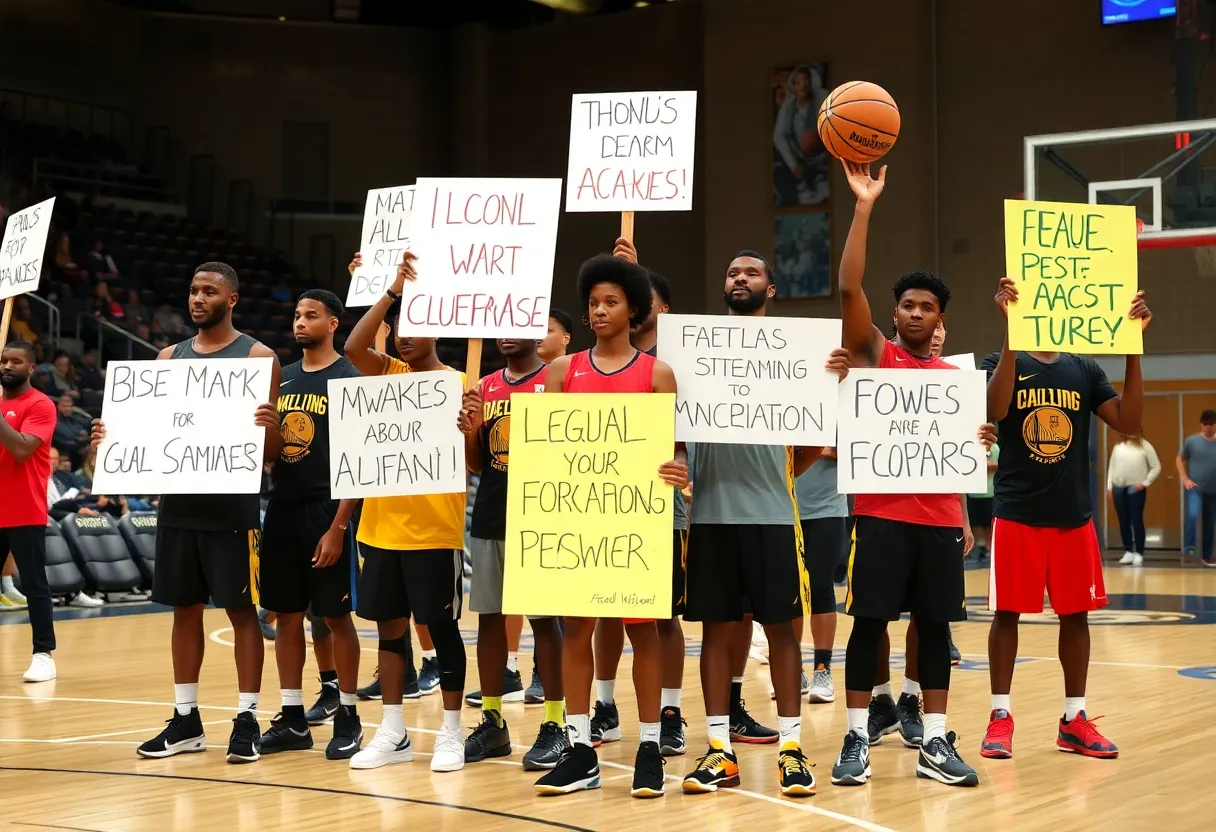News Summary
WNBA players, led by Angel Reese, are intensifying demands for better pay as collective bargaining agreement negotiations progress. With current salaries trailing other major leagues and reports of significant league losses, players are pushing for equitable revenue sharing. Recent All-Star solidarity efforts have drawn attention to these disparities, highlighting the urgent need for financial reform. As negotiations continue, tensions rise with potential threats of player walkouts looming if a new agreement isn’t reached soon.
Chicago – WNBA players are amplifying their calls for fair pay as negotiations for a new collective bargaining agreement (CBA) intensify. With the current deal set to expire soon, players, led by Chicago Sky forward Angel Reese, are advocating for higher salaries and better revenue sharing from the league. Recent meetings between approximately 40 players and WNBA officials have highlighted the players’ collective commitment to achieving equitable financial compensation.
Angel Reese has vocalized her determination on social media, indicating a willingness to implement a lockout if necessary to secure better pay for the athletes. She emphasized the shared goal among players to receive a fair share of the revenue generated by the league—an issue that has sparked considerable debate and tension. During a recent All-Star Game, players unified to send a strong message by wearing shirts that read “Pay Us What You Owe Us,” attracting support from fans during both warm-ups and the MVP award presentation. This act of solidarity came in a context where players felt their demands for a fairer distribution of earnings had not been adequately addressed in CBA discussions.
The WNBA reported a substantial financial loss of $40 million in the previous year, a statistic often cited by league officials when justifying the current salary structure. The average salary for WNBA players stands at roughly $147,745, the lowest among major professional sports leagues in the United States. In contrast, Major League Soccer (MLS) players earn an average of $594,000, while athletes in the NBA, NFL, and NHL benefit from a more favorable revenue-sharing system that allocates between 47% to 51% of league revenue to players. Currently, WNBA players receive less than 10% of the league’s revenue, which has prompted concerns regarding fairness and sustainability in their earnings moving forward.
Under the existing CBA, WNBA players are compensated based on “excess revenue,” which is contingent upon the league meeting specific financial targets. This stands in stark contrast to the MLS, which ensures that players receive a guaranteed 25% share of excess revenue without such conditional frameworks. The potential for a player walkout looms large if negotiations do not yield a new CBA by October, reflecting mounting tensions between the players and league administration.
Current salary ranges for WNBA players vary considerably, from $66,079 to $249,244, with the average base salary at approximately $102,249. These figures are dwarfed by NBA salaries; for example, the NBA minimum salary starts at $1.27 million, with the average playing salary exceeding $13 million. Some analysts argue that the differences in pay structures between the leagues are influenced by their distinct histories, revenue generation models, and the level of public engagement they command.
The players’ outcry for better pay coincides with the league’s development initiatives, including a recently signed $2.2 billion media deal and plans for expanding into three new teams. Despite these growth opportunities, the significant financial challenges faced by the WNBA have made wage parity a contentious topic among players. Reese expressed a commitment to educate herself on these issues while also advocating for her peers and striving for an equitable contract.
WNBA Commissioner Cathy Engelbert has characterized the recent negotiations as “constructive,” yet has acknowledged the necessity for ongoing dialogue to bridge the current divide between players and league officials. As discussions continue, the future of the WNBA will hinge on its ability to address player compensation and ensure that athletes are rewarded fairly for their contributions to the sport.
Deeper Dive: News & Info About This Topic
HERE Resources
Additional Resources
- WAPT: WNBA Salaries Compared to Other Leagues
- Newsweek: Angel Reese Sends Clear Message on WNBA Salary Negotiations
- Times of India: ‘We Are Underpaid’ – Stephen Curry Sparks Salary Debate
- New York Times: WNBA CBA Negotiations and Player Salaries
- The Guardian: WNBA Players Say They’re Not Paid What They’re Owed
- Wikipedia: WNBA
- Google Search: WNBA salary negotiations
- Google Scholar: WNBA salary disparities
- Encyclopedia Britannica: Women’s National Basketball Association
- Google News: WNBA salary
Author: STAFF HERE NEW YORK WRITER
The NEW YORK STAFF WRITER represents the experienced team at HERENewYork.com, your go-to source for actionable local news and information in New York, the five boroughs, and beyond. Specializing in "news you can use," we cover essential topics like product reviews for personal and business needs, local business directories, politics, real estate trends, neighborhood insights, and state news affecting the area—with deep expertise drawn from years of dedicated reporting and strong community input, including local press releases and business updates. We deliver top reporting on high-value events such as New York Fashion Week, Macy's Thanksgiving Day Parade, and Tribeca Film Festival. Our coverage extends to key organizations like the Greater New York Chamber of Commerce and United Way of New York, plus leading businesses in finance and media that power the local economy such as JPMorgan Chase, Goldman Sachs, and Bloomberg. As part of the broader HERE network, including HEREBuffalo.com, we provide comprehensive, credible insights into New York's dynamic landscape.





